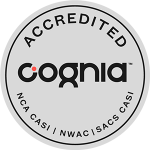“I can’t do math!” We’ve all heard it exclaimed by fellow students, coworkers, and maybe even our own parents. Many students experience a fear or anxiety towards math, commonly referred to as “math anxiety.” This can manifest as a reluctance to participate in math class or complete math homework, a feeling of dread or panic when faced with math problems, or even physical symptoms such as sweating, shaking, or nausea.
In this blog post, we outline a few ways that you can help your student overcome math anxiety.
Growth Mindset Intervention

Educational psychologist Gerardo Ramirez and his team found that helping students adopt a growth mindset instead of an “all or nothing” mindset really helps them keep a more positive perspective on their approach to math. Growth mindset focuses on the idea that although they “can’t” do something now, your students can learn how to do it and be successful in the future. Instead of “I can’t,” we rephrase to “I can’t yet.” Growth mindset also focuses on any growth at all rather than a student having to understand everything all at once. If progress is made, that’s the element of their learning to celebrate and focus on instead of focusing on what they don’t know yet.
The researchers found the combining mindfulness with growth mindset to calm students’ nerves and help them focus their thoughts helped as well. The combined approach, “not only reduced math anxiety, but had also increased math self-efficacy” among students. Before your student sits down to work on math, take some time to do some guided breathing exercises with them. If they feel weird doing these with you, there are plenty of apps and websites that provide guided breathing for free. Once their physical body is calm, then create some achievable, small goals for them to accomplish so that they can celebrate and start building their ability to practice a grown mindset.
Watch Your Own Attitude
Along with math anxiety comes math avoidance. Since it’s impossible in today’s academic culture to avoid math altogether, this become a major hurdle for students to jump. Research funded by the National Science Foundation found that “Higher levels of math anxiety were associated with a tendency to select easier, low-reward problems over harder, high-reward math.” What does this have to do with anyone’s attitude about math? When students hear the people around them saying things like “I can’t do math,” “Math is horrible,” or, “You’re just like me. I never could do math,” this sets them up to believe that they are not capable of more difficult math work.
Instead, they set themselves up for failure by staying in a comfortable work zone, never allowing themselves to find out that they can do more. When a student believes that they can’t do math and that math is “too hard,” their anxiety grows as they avoid the work that’s more challenging. And let’s face it, your middle and high school students aren’t doing primary level math, so this is not going to work.
Individuals who experience math anxiety will do whatever it takes to avoid math courses and miss out on interesting STEM courses, too. If they have negative feelings and apprehension toward math related content, and if they’re surrounded by voices that tell them these feelings are valid and even inherited, then they’re going to miss out on a lot of opportunities.
Build Working Memory
Sometimes the issue of math anxiety doesn’t crop up until middle school. That’s because the math involved in the primary grades doesn’t require much for students’ working memory. According to the National Library of Medicine, “Working memory is the retention of a small amount of information in a readily accessible form.” When students are younger, they are expected to use less of their working memory to solve math problems. When the math becomes more complicated, their working memory is overrun by mathematical concepts all at once. Additionally, they’ve got outside stimuli still seeking their attention and their everyday thoughts floating through, too. In upper level mathematics, the working memory can become overloaded, causing anxiety to set in.
Tricks for supporting your student’s working memory can help alleviate some of the overload that triggers anxiety. Encouraging your student to use written notes to refer to information rather than having to store it all at once in their minds, creating mnemonic devices to remember essential information, and talking out strategies verbally before actually doing them are all ways to alleviate the working memory’s load when sitting down to focus on math.
Math benefits the brain is so many ways that having a good relationship with math can really change a student’s trajectory in life. It helps students develop better analytical thinking and problem-solving skills and helps them learn how to handle more than one task at a time. Math work develops logic and analysis skills that students can apply to their lives in the long term, long after they’ve graduated from high school.
About Northgate Academy
If you’re not already a student at Northgate Academy but you’re interested in using our faith-based online high school program as an accredited choice for your Christian student, your Christian school, or as a resource for homeschool coursework, you can check out our programs online. We welcome and support our part-time students too. Every full-time student at NGA is assigned an Academic Success Coach and can communicate with subject matter experts via email or reach out to our staff through online chat and text.
Still have questions? Feel free to send us a text at 763-412-4701 or call us at 800-339-7132. Our academic support team will be happy to answer your questions or help guide you to the best program for you or your child.




